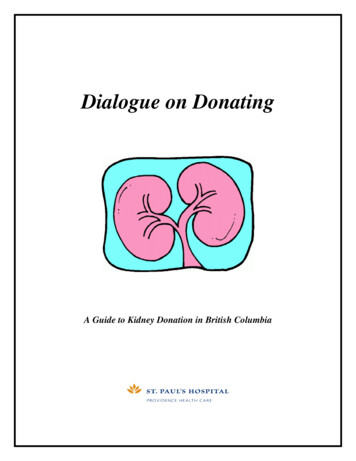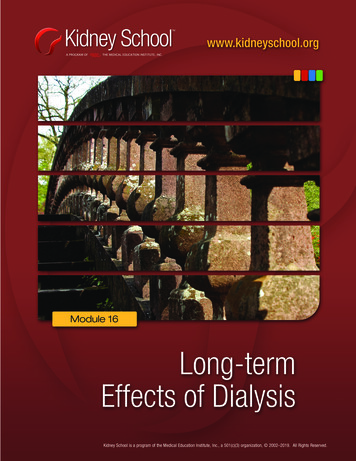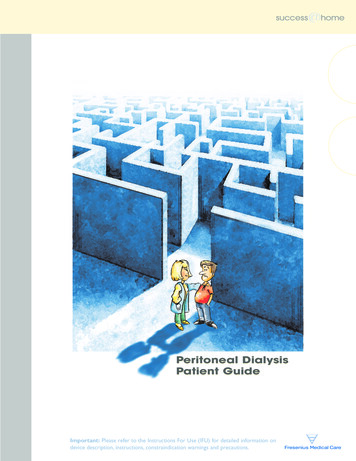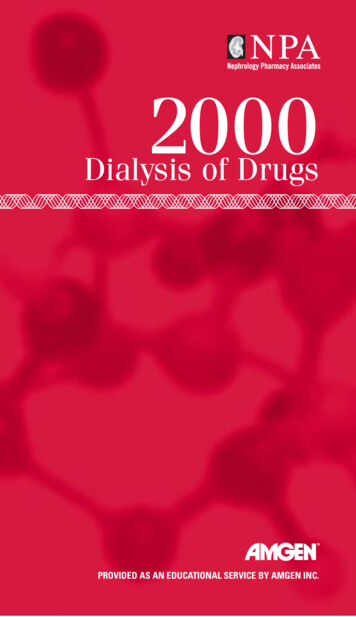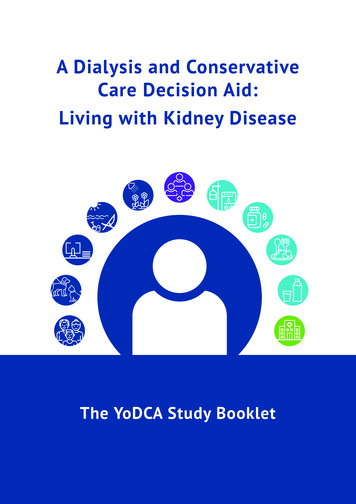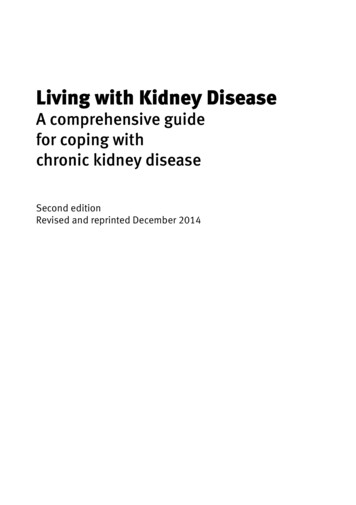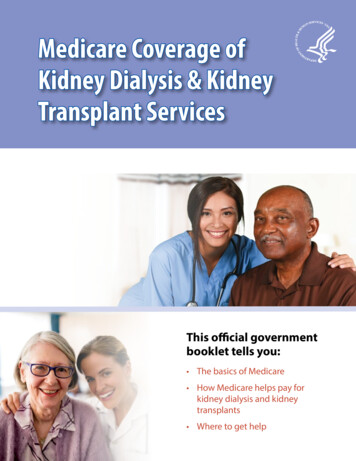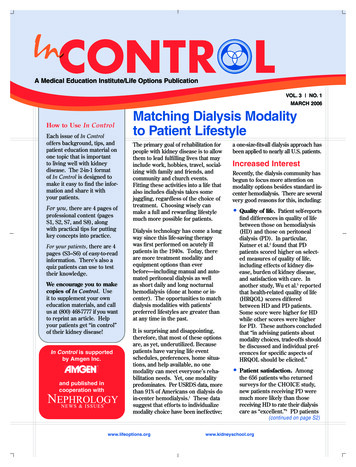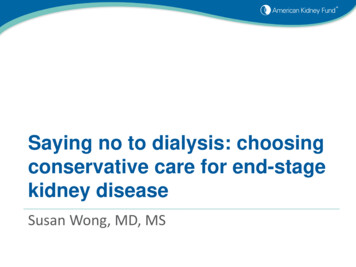
Transcription
Saying no to dialysis: choosingconservative care for end-stagekidney diseaseSusan Wong, MD, MS
Thanks to our speaker!Dr. Susan Wong Nephrologist at the VA Puget SoundHealth Care System in SeattleActing Instructor in the Division ofNephrology at the University ofWashingtonConducts research on treatmentpractices and end-of-life care forpatients with kidney disease.Her work describes the patient-,provider- and system-level factors thatshape these treatment practices.
“I can’t imagine that dialysis is going to improveanything about the way I live right now. I really don’tunderstand my life between now and when I am notalive. I suppose I should ask that question but I haven’t.It is almost as if [the nephrology clinic visit] is not theright setting for those things. It is always one that talksabout solving a health problem and getting better andnow maintaining a level of health and not getting anyworse. To ask questions about what happens when itshould get worse or what I should be expecting itseems like it is a different topic that doesn’t belong inthis discussion. I don’t know where it would belong.”
Outline1. Who receives conservative care?2. Why have some patients chosen conservativecare?3. What is conservative care?
Treatment choicesConservativeCareDialysisTransplant
1. Who receives conservative care?
Trends in conservative care 1 in 7 patients who reach the advanced stages ofkidney disease (stage 5 or 15% kidney function)pursue conservative care.
% patientsTreatment decisions of patients with stage 5 advancedkidney ainstdialysisPreparing fordialysis butdid not startdialysisReceiveddialysisAgeWong, CJASN 2016
Trends in conservative care 1 in 7 patients who reach the advanced stages ofkidney disease (stage 5 or 15% kidney function)pursue conservative care. Conservative care is more common among patientswho are older and white, and have more comorbidillnesses.
Trends in conservative care 1 in 7 patients who reach the advanced stages ofkidney disease (stage 5 or 15% kidney function)pursue conservative care. Conservative care is more common among patientswho are older and white, and have more comorbidillnesses. Conservative care is less common in the US than inother developed countries. In other countries, for every one patient whoreceives dialysis, another patient does not.
Proportion of patients with stage 5 advanced kidneydisease who went on to receive dialysis% patients1009080706050403020100 4545-5455-6465-7475-84 85AgeUSCanadaAustralia & New ZealandWong, CJASN 2016
2. Why have patients opted forconservative care?
What conservative care might offer Conservative care is an alternative treatment forpersons who do not view dialysis as aligned withtheir healthcare goals.
Healthcare goals & values“Will I live to see mydaughter getmarried?”Qualityof lifeIndependenceLongevity“Will my wife need toquit her job to takecare of me?”“Can I still travel,have energy togarden?”Relationships“Can I stay athome or does thismean a nursinghome?”
“I am nearly 94 so that’s is and at the moment I feel fineso that’s my life story just let nature take itscourse I’m getting old now.”“I couldn’t face all that coming up to the hospital nearlyevery day Three times a week isn’t [dialysis]? I’ve liveda good life I want to stay at home and not betravelling to the hospital.”“Well, it’s for no reason really What is the point? Thereisn’t any. You have to accept the inevitable.”Johnston, J Clin Nurs 2011
“I don’t want to be a nuisance to anybody I am nearly 97so [dialysis] is not really worth it for sake of the fewmonths which it would give me.”“I can’t drive and I live out of town so [dialysis] is relyingon hospital transport and I mean you could be waitinghours I just couldn’t cope with [dialysis].”“It did occur to me that [on dialysis] you were, sort of,living for tomorrow, for your next treatment, fortomorrow, for your next treatment. And it made methink, well, I wonder if it’s better to live as best you canand let time take its course.”Tonkin-Crine, AJKD 2015
What conservative care might offer Conservative care is an alternative treatment forpersons who do not view dialysis as aligned withtheir healthcare goals. For some patients, life expectancy (how long you willlive) with conservative care may be similar to thatwith dialysis.
Life expectancy after reaching stage 5 advanced kidney disease forolder patients (75 years) with significant comorbidityMediansurvival withconservativecare, monthsStudy author,YearCountryMedian survivalwith dialysis,monthsMurtagh, 2007United Kingdom2323Chandna, 2011United Kingdom2620Hussain, 2013United Kingdom2924Shum, 2014Hong Kong3624Verberne, 2016Netherlands3630
What conservative care might offer Conservative care is an alternative treatment forpersons who do not view dialysis as aligned withtheir healthcare goals. For some patients, life expectancy (how long you willlive) with conservative care may be similar to thatwith dialysis. Patients who receive conservative care may havesimilar symptoms and quality of life as those whoreceive dialysis.
Comparison of symptoms in patients on dialysis versus conservative carePrevalenceSeverity score(0-none; 2Muscle cramps40%33%4.14.1Sexual problems34%9%6.83.3Limb swelling29%31%4.44.1Restless leg13%13%4.13.7Difficulty sleeping62%49%5.45.8Yong, Palliat Med, 2009
3. What is conservative care?
Attributes of conservative care1.2.3.4.Available from diagnosis to death.Balance between restorative and supportive care.Interdisciplinary approach to care.Clear communication about prognosis andanticipatory guidance.5. Family and caregiver support.Noble, J Adv Nurs 2007
Supportive care vs. Restorative careSupportive careRestorative careDeathDiagnosisSupportive care: patient-specific approach to care that aims toreverse, halt or minimize how disease impacts a patient’s life.Restorative care: disease-specific approach to care thataims to reverse, halt or minimize the disease process.
Disease-specific ApproachAnemia ErythropoetinEdema FurosemideAcidosis Sodium bicarbonateProteinuria LisinoprilHyperphosphatemia Calciumacetate
Anemia ErythropoetinEdema FurosemideAcidosis SodiumbicarbonateProteinuria LisinoprilHyperphosphatemia CalciumacetatePhilosophical shift in careDisease-specific ApproachPatient-specific ApproachWhat concerns do you bringto our appointment today?What are your goals for yourhealthcare?What is most important toyou when facing seriousillness?
Anemia ErythropoetinEdema FurosemideAcidosis SodiumbicarbonateProteinuria LisinoprilHyperphosphatemia CalciumacetatePhilosophical shift in careDisease-specific ApproachPatient-specific ApproachFatigue ReducemedicationsItch gabapentin, UVB,emollientsBeing at home AdvancedirectiveStaying connectedwith loved ones Creatinglegacy
Interdisciplinary harmacist
Social worker Helps patients and families solve and cope witheveryday problems that arise or are impacted byserious illness. Addresses emotional, financial, housing, andcaregiving needs. Provides individualsupport and/or helpspatients navigatelocal, state or federalresources.
Chaplain A non-denominational cleric who provides spiritualsupport to patients & families facing serious illness. A licensed provider with higher education (typicallyin theology, religion or philosophy) and hascompleted an internship/residency trainingSpirituality: a complex and multidimensional part of thehuman experience that encompasses the search formeaning, purpose and truth in life, connection andinner peace, and the beliefs and values by which onelives.
Palliative medicine provider Specially-trained consulting doctors and nurses whoassist primary providers (ex. primary care doctors,nephrologists). Their focus is on providing relieffrom symptoms and stress ofserious illness occurring at anypoint in time during the diseasecourse. Outpatient, inpatient andhome-based.
Hospice Services focused on providing expert medical care topatients and families near the end of life (usually last6 months of life) and after death (bereavementservices). Services are an entitlement paid for by Medicare(aged 65 years), Medicaid, the VA and many privateinsurances. Home- or institution-based.
Hospice services Medical advice.Medications.Home visits.24/7 on-call nursing.Assistance with personal care needs and practicalhousehold support.Financial counseling.Companionship and compassionate support.Bereavement counseling and support groups.Funeral assistance.
The path aheadHospice referralRoutinenephrologyvisitsPalliative medicine,chaplaincyPharmacist, dietician,social worker
Spheres of energyCommunityMedical visitsHomePatientPatient
Conclusion1. Conservative care is a reasonable therapeuticalternative to dialysis.2. Conservative care is best suited for patients when itupholds the values and healthcare goals of patients.3. Conservative care is a patient- (and family-)centered, interdisciplinary approach to care fromdiagnosis to death.
Join us for next month’s webinar!Tuesday, May 30, 2-3 p.m. (ET)“Humanizing dialysis”Join us to learn about: Dr. Brigitte Schiller Chief Medical Officer, Satellite HealthcareLeads Quality and Medical Policy Strategyand oversees the clinical strategy anddevelopment of Satellite Healthcare toimprove patient outcomesHow patients can achieve a full life by matching with the besttreatment option for their lifestyleThe data on the current distribution of ESRD treatmentmethods from the US and worldwideWhat is needed for a more individualized approach to ESRDcare. How can we humanize dialysis care?Go to www.KidneyFund.org/webinars to learnmore and register!
“It did occur to me that [on dialysis] you were, sort of, living for tomorrow, for your next treatment, for tomorrow, for your next treatment. And it made me think, well, I wonder if it’s better t
